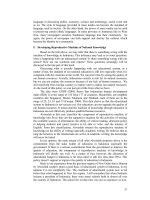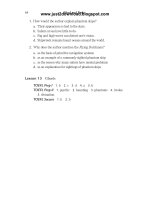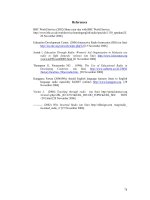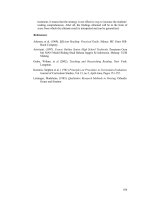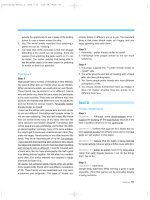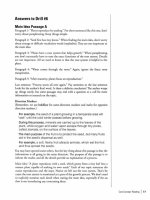Correct english part 9 pdf
Bạn đang xem bản rút gọn của tài liệu. Xem và tải ngay bản đầy đủ của tài liệu tại đây (114.1 KB, 10 trang )
exclamation (not -claim-)
exclamation mark Use an exclamation mark:
(i) with exclamations
Ouch! Oh! Hey!
(ii) with vehement commands
Stop thief! Help! Jump!
See
COMMANDS.
exercise (not excercise)
exhausted (not exausted)
exhausting or EXHAUSTING = tiring
exhaustive? EXHAUSTIVE = thorough, fully
comprehensive
exhibition
exhilarated (not -er-)
expedition (not expidition)
The second syllable is derived from the
Latin word pes, pedis (foot, of the foot).
This may help you to remember -ped
The words pedal, pedestrian, pedometer
all come from this same Latin root.
expendable (not -ible)
expense
expensive
experience (not expierience, not -ance)
The second syllable is derived from the
Latin word per, meaning through.
(Experience is what we gain from going
‘through’ something.)
explain explained, explaining
explanation (not -plain-)
explicit or implicit? EXPLICIT = stated clearly and openly
IMPLICIT = implied but not actually
stated
EXPLICIT OR IMPLICIT?
73
TEAMFLY
Team-Fly
®
exspense Wrong spelling. See EXPENSE.
exspensive Wrong spelling. See
EXPENSIVE.
exstremely Wrong spelling. See
EXTREMELY.
extraordinary extra + ordinary
extravagance (not -ence)
extravagant (not -ent)
extremely extreme + ly
extrordinary Wrong spelling. See
EXTRAORDINARY.
exuberance (not -ence)
exuberant (not -ent)
eyrie See
EERIE OR EYRIE?.
EXSPENSE
74
F
facetious (All five vowels occur in this word once
only and in alphabetical order.)
facilities or faculties? FACILITIES = amenities
FACULTIES = mental or physical
aptitudes
facinate Wrong spelling. See
FASCINATE.
factory (singular) factories (plural)
See
PLURALS (iv).
Fahrenheit (not -ie-)
See
EI/IE SPELLING RULE.
faithfully faithful + ly
See SINCERELY for guidelines when
punctuating a complimentary close to a
letter (fully blocked and also traditional
layout).
familiar (not fammiliar)
family (singular) families (plural) (not -mm-)
farther or further? Both words can be used to refer to
physical distance although some writers
prefer to keep ‘farther’ for this purpose.
I can walk FARTHER than you.
I can walk FURTHER than you.
FURTHER is used in a figurative sense:
Nothing was FURTHER from my mind.
FURTHER is also used in certain
expressions:
FURTHER education
until FURTHER notice
fascinate (not facinate)
75
favourite (not -ate)
feasible (not -able)
February Notice the word has four syllables and not
three as it is often mispronounced.
fewer or less? FEWER is the comparative form of ‘few’.
It is used with plural nouns:
FEWER vegetables
FEWER responsibilities
FEWER children
LESS is the comparative form of ‘little’.
It is used in the sense of ‘a small amount’
rather than ‘a fewer number of’:
LESS enthusiasm
LESS sugar
LESS petrol
LESS THAN is used with number alone,
and expressions of time and distance:
LESS THAN athousand
LESS THAN ten seconds
LESS THAN four miles
It is considered incorrect to use ‘less’
instead of ‘fewer’ although such confusion
is frequent in popular speech.
As a rule of thumb, remember:
FEWER =notsomany
LESS =notsomuch
fiance
´
or fiance
´
e? FIANCE
´
= masculine
FIANCE
´
E = feminine
Note theaccentinbothwords.
fictional or fictitious? FICTIONAL = invented for the purpose
of fiction, related to fiction
FICTIONAL texts
FICTIONAL writing
FAVOURITE
76
FICTITIOUS = false, not true
a FICTITIOUS report
a FICTITIOUS name and address
Either word can be used to describe a
character in a work of fiction: a
FICTIONAL or FICTITIOUS character.
fiery (not firey)
fifteen fifteenth
fifth
fifty fiftieth
finally final + ly (not -aly)
finish finished, finishing (not -nn-)
firey Wrong spelling. See
FIERY.
flamingo (singular) flamingoes or flamingos (plural)
flammable or Both words mean ‘easily bursting into
inflammable flame’. People often think that
inflammable is the negative form but the
prefix ‘in’ here means ‘into’.
The opposite of these two words is
non-flammable or non-inflammable.
flee they fled, have fled, are fleeing
flexible (not -able)
flu or flue? FLU = influenza (not ’flu although an
abbreviation)
FLUE = a pipe or duct for smoke and
gases
fluorescent (not flourescent)
fly they flew, have flown, are flying
focus focused or focussed (both correct)
focusing or focussing (both correct)
for- or fore-? A useful rule of thumb is to remember the
usual meaning of the prefixes:
FOR- OR FORE-?
77
FOR- = not, or something negative
(forbid, forfeit, forget, forsake)
FORE- =before
(foreboding, forecast, forefathers)
See individual entries for
FORBEAR OR FOREBEAR?
FOREWORD OR FORWARD?
.
forbear or forebear? FORBEAR (stress on second syllable) =
restrain oneself
FORBEAR or FOREBEAR (stress on first
syllable) = ancestor
forbid forbad or forbade (both correct),
forbidden, forbidding
forcible (not -able)
forecast (not forcast)
forefend/forfend Either spelling can be used.
foregather/forgather Either spelling can be used.
forego/forgo Either spelling can be used.
foreign An exception to the rule.
See
EI/IE SPELLING RULE.
foreign plurals Some foreign words in English have
retained their foreign plurals. Some have
both foreign and English plurals. Take
care, however, with the words that are
asterisked below because the foreign plural
of these is used in a different sense from
the English plural. Check these words
under individual entries for the distinction
in meaning.
singular -a foreign plural English plural
alga algae –
antenna antennae antennas*
formula formulae formulas*
larva larvae –
nebula nebulae nebulas
vertebra vertebrae vertebras
FORBEAR OR FOREBEAR?
78
singular -eau foreign plural English plural
-eu
adieu adieux adieus
bureau bureaux bureaus
chateau chateaux –
milieu milieux milieus
plateau plateaux plateaus
tableau tableaux –
singular -ex
-ix
appendix appendices appendixes*
index indices indexes*
matrix matrices matrixes
vortex vortices vortexes
singular -is
analysis analyses –
axis axes –
crisis crises –
diagnosis diagnoses –
hypothesis hypotheses –
parenthesis parentheses –
synopsis synopses –
singular -o
graffito graffiti –
libretto libretti librettos
tempo tempi tempos
virtuoso virtuosi virtuosos
singular -on
automaton automata automatons
criterion criteria –
ganglion ganglia ganglions
phenomenon phenomena –
singular -um
aquarium aquaria aquariums
bacterium bacteria –
curriculum curricula curriculums
datum data –
erratum errata –
memorandum memoranda memorandums
millennium millennia millenniums
referendum referenda referendums
stratum strata –
ultimatum ultimata ultimatums
FOREIG N PL URALS
79
singular -um foreign plural English plural
ovum ova –
singular -us
bacillus bacilli –
cactus cacti cactuses
fungus fungi funguses
hippopotamus hippopotami hippopotamuses
nucleus nuclei –
radius radii radiuses
stimulus stimuli –
syllabus syllabi syllabuses
terminus termini terminuses
tumulus tumuli –
The Hebrew plural -im is found in these three
words:
cherub cherubim cherubs
kibbutz kibbutzim –
seraph seraphim –
This list is by no means comprehensive
but it does contain most of the words that
are commonly used.
foresake Wrong spelling. See
FORSAKE.
forest (not forrest)
foreword or forward? Use these exemplar sentences as a guide:
The Poet Laureate had written a
FOREWORD for the new anthology.
I am looking FORWARD to the holiday.
Will you please FORWARD this letter?
forfeit (not -ie-, exception to the rule)
See
EI/IE SPELLING RULE.
forfend See
FOREFEND/FORFEND.
forgather See
FOREGATHER/FORGATHER.
forgo See
FOREGO/FORGO.
formally or formerly? FORMALLY = in a formal manner
FORMERLY = previously, at an earlier
time
FORESAKE
80
formula (singular)
There are two plurals.
Use formulae in a scientific or
mathematical context.
Use formulas in all other cases.
forrest Wrong spelling. See
FOREST.
forsake (not fore-)
See
FOR OR FORE?.
fortunately fortunate + ly (not -atly)
See
ADDING ENDINGS (iii).
forty (not fourty)
forward See
FOREWORD OR FORWARD?.
frantic
frantically frantic + ally (not franticly)
freind Wrong spelling. See
FRIEND.
frequent (not -ant)
Use as an adjective (stress on first
syllable):
There were FREQUENT interruptions.
Use as a verb (stress on second syllable):
They FREQUENT the most terrible pubs.
fresco (singular) frescoes or frescos (plural)
See
FOREIGN PLURALS.
friend (not -ei-)
frieze (not -ei-)
See
EI/IE SPELLING RULE.
frighten frightened, frightening
(not frightend, frightning)
frolic frolicked, frolicking, frolicsome
See
SOFT C AND SOFT G.
fuchsia (named after Leonhard Fuchs, German
botanist)
FUCHSIA
81
-ful When full is used as an ending to a word,
it is always spelt -ful:
beautiful
careful
wonderful
hopeful, etc.
fulfil fulfilled, fulfilling, fulfilment
See
ADDING ENDINGS (iv).
full stops See
END STOPS.
See
COMMAS (b).
fungus (singular) fungi or funguses (plural)
See
FOREIGN PLURALS.
further Se e
FARTHER OR FURTHER?.
fuschia Wrong spelling. See
FUCHSIA.
-FUL
82
